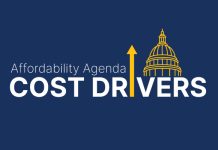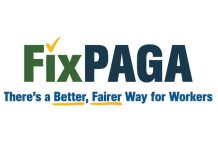Rebrands Job Killer title to reflect CalChamber’s commitment to ‘good jobs, affordable living’
For more than two decades, CalChamber has issued the “Job Killer” list, a comprehensive package of legislation that would have historically eliminated jobs or opportunities for investment in job growth for California businesses. The list has been hugely successful for the business community, as more than 93 percent of bills that have wound up on the list over the years have been halted in the legislative process.
California businesses and consumers alike are focused on the affordability of everyday life,” said CalChamber President & CEO Jennifer Barrera. “While the Job Killer list has served us well for more than 25 years, it has become clear that CalChamber’s focus must no longer be limited to legislation that just impacts jobs. Businesses and everyday
Californians are struggling to keep up, and going forward, our policy positions will include a focus not only on jobs, but also legislation that is adding unnecessary costs and mandates on businesses that will ultimately lead to higher prices for consumers and further increase the cost of living in California.”
As CalChamber looks to not only oppose legislation that will drive higher costs and limit job creation, this year’s list also includes policies that promote good paying jobs and improve affordability for all Californians.
CalChamber’s list will include two categories moving forward: Cost Cutters for legislation that reduces costs for Californians and Cost Drivers which will increase costs for small businesses and consumers.
“Unfortunately, we’ve seen far too many bills that are costly for Californians in 2025 than we have in previous years,” added Barrera. “The 2024 election has taught us that affordability and daily living are top of mind for all Californians, and CalChamber will support those issues, ensuring policy makers hear that message loud and clear.”
Today’s announcement outlines the first batch of CalChamber Cost Cutter and Cost Driver bills and will be updated as legislation is continuously amended over the next several weeks and months:
COST CUTTERS: Legislation that reduces costs for businesses and consumers
SB 540 (Becker)
Independent Regional Energy Organization: Authorizes the California Independent System Operator and California Utilities to integrate into a broader regional energy market governed by an independent regional organization. Will reduce energy costs for Californians.
SB 607 (Wiener)
CEQA Reform for Infill projects: Exempts certain housing rezoning projects from CEQA and improves current CEQA exemptions to make them easier to use for housing projects. Increased housing stock will lead to a reduction in the cost to buy or rent a house.
AB 231 (Ta)
Work Opportunity Tax Credit: Provides a tax credit to businesses who hire previously incarcerated individuals who are re-entering the workforce, reducing costs on businesses and improving opportunities for workers.
AB 265 (Caloza)
Small Business Recovery Act: Allows the Office of Small Business Advocate to provide grants to small businesses impacted by the Los Angeles fires to help them recover and rebuild.
AB 417 (Carrillo) Enhanced Infrastructure Financing Districts: Improves the ability for local governments to build critical infrastructure and provide financing for economic development in targeted districts within their jurisdiction. It will allow economic development projects to receive additional financing, which incentivizes businesses to invest and create more jobs.
AB 609 (Wicks)
CEQA Reform for Infill Projects: Will help to reduce the cost of housing, by reforming the permitting process for infill housing, which will allow for the state to build more housing and drive down prices.
AB 685 (Solache)
Small Business Recovery Act: Authorizes the Office of Small Business Advocate to provide funding and technical assistance to small businesses impacted by the January 2025 fires in Los Angeles and Ventura Counties.
AB 941 (Zbur)
CEQA Reform for Electricity Infrastructure Projects: Reduces the time for electricity infrastructure projects to go through permitting, which will allow for projects to be built faster. Regulatory certainty will allow for a reduction in energy costs.
AB 1308 (Hoover)
Expedites entitlement process for housing construction: Requires the building department to provide an applicant of a residential building permit with an estimated timeframe in which the inspection of the permitted work will be completed, upon receiving a notice of the completion of the permitted work, to reduce costs and ultimately housing prices.
AB 1138 (Zbur) & SB 630 (Allen)
Film Tax Credit: More than doubles the State’s Film Tax Credit to $750 million annually that will help to grow and retain jobs in one of California’s signature industries, and ultimately strengthen the economy.
COST DRIVERS: Legislation that increases costs for businesses and consumers
SB 7 (McNerney)
Restricts Use of Automated Decision Systems in Employment: Imposes impractical requirements on employers of every size related to automated decision systems, which will discourage the use of such tools and subject employers to costly litigation and onerous new compliance procedures, thereby driving up costs and ultimately impacting consumer prices.
SB 222 (Wiener)
Climate-Related Disaster Liability: Sets a troubling precedent of singling out a small, targeted group of companies and makes them jointly, severally, and strictly liable for virtually all damages suffered as a result of climate-related disasters regardless of cause or fault.
SB 259 (Wahab)
Online Pricing: Prohibits businesses from using any input data to create prices or discounts. Forces companies to overhaul their pricing models and strategies at significant cost, to the detriment of both the businesses themselves and their consumers. This threatens not only the profitability of businesses, but also potentially reduces the availability of discounts and personalized deals for consumers.
SB 295 (Hurtado)
Pricing Algorithms: Prohibits a person from using or distributing pricing algorithms that use, incorporate, or were trained on “nonpublic competitor data.” Exposes businesses to significant uncertainty and aggressive liability and creates a chilling effect on the use of this technology by imposing significant cost on all businesses using technological tools.
SB 310 (Wiener)
Expands Private Right of Action for Penalties: Creates a new private right of action for wage and hour penalties that will be manipulated by trial attorneys, undermining the 2024 PAGA Reform, which sought to reduce avenues for litigation abuse and overall costs on employers.
SB 384 (Wahab)
Prohibition on Using Information to Set Competitive Pricing: Effectively banning the use of technology to help set prices or help manage supply levels. Will make it harder for businesses to offer discounts and competitive pricing to their customers.
SB 464 (Smallwood-Cuevas)
Publication of Pay Data: Encourages litigation against employers based on the publication of broad, unreliable data collected by the state, which will unnecessarily drive up costs.
SB 573 (Smallwood-Cuevas)
Corporate Tax Increase: More than doubles California’s corporate tax rate (to as much as 22.5%) for targeted employers, decreasing California’s business competitiveness and increasing employer costs.
SB 601 (Allen)
Punitive and Onerous Water Quality Permitting Requirements: Creates duplicative permitting obligations and dramatic legal liability requirements for businesses, agriculture, and water and wastewater utilities by granting the water boards broad authority to impose permitting requirements without considering economic impacts or the critical need for housing and recycled water projects.
SB 632 (Arreguín)
Expands Costly Presumption of Injury: Significantly increases workers’ compensation costs for public and private hospitals by presuming certain diseases and injuries are caused by the workplace and establishes an extremely concerning precedent for expanding presumptions into the private sector. Has been tried nine times before and failed every time.
SB 682 (Allen)
De Facto PFAS Ban: Creates a de facto ban on the use of PFAS in all commercial and consumer products, unless DTSC is petitioned and makes an affirmative determination that the PFAS in a particular product is an unavoidable use. Because of the breadth and scope of PFAS use, including in aerospace, lithium-ion batteries, medical devices, automotive and semiconductors, to name a few, the regulatory program established is unworkable and ultimately will lead to a ban on critically important products or otherwise make certain products less safe, and ultimately drive up prices for consumers.
SB 684 (Menjivar)
Climate Superfund: Imposes retroactive financial liability on companies for lawful greenhouse gas emissions dating back to1990, sending the message that even strict adherence to the state’s compliance programs is not enough to avoid retroactive penalties down the road.
SB 763 (Hurtado)
Vast Expansion of State Antitrust Penalties: Raises penalties under California’s antitrust law, the Cartwright Act, from $1,000,000 to $100,000,000, and individual penalties from $250,000 to $1,000,000, with no demonstrated need for reform or adjustment, thereby increasing liability and costs on businesses.
SB 766 (Allen)
Legal Liability for Car Dealers: Dramatically increases legal liability to car dealers leading to a flood of new lawsuits and increased costs for buying or leasing cars for consumers.
AB 298 (Bonta)
Prohibits Cost Sharing: Increases premiums for California’s employers and employees by restricting insurers from imposing a deductible, coinsurance, or copayment for in-network health care services provided to an enrollee under 21 years of age.
AB 405 (Addis)
New Climate Disclosure Requirements: Imposes costly, duplicative, and misaligned regulatory requirements on apparel companies that will increase clothing prices and worsen affordability for Californians. Dramatically expands existing disclosure rules under SB 253 (2023), for which rulemaking hasn’t even begun yet.
AB 858 (Lee)
Onerous Return to Work Mandate: Unnecessarily transforms prior, COVID-19 specific law that created an onerous and stringent process for specific employers to return employees to the workforce for specified industries into a new mandate that applies to any natural disaster.
AB 1018 (Bauer-Kahan)
Impact Assessments of Automated Decision Systems: Limits use of automated decision systems (ADS), including by small businesses, which will lead to significant liability and increased costs that will ultimately be borne by consumers. It would also hinder many beneficial uses of ADS, including but not limited to: enabling faster approvals and expanded access to credit and enhancing real-time fraud detection.
AB 1221 (Bryan)
Restricts Use of Data in Employment: Imposes impractical requirements on employers of every size relating to any worker data collected by a workplace surveillance tool, which is defined so broadly that it would impact everything from security footage to emails. These requirements will drive up costs and impact consumer prices.
AB 1234 (Ortega)
Creates New Penalty and Revises Wage Claim Procedures: Imposes new, automatic thirty percent penalty on all orders issued by the Labor Commissioner, which penalizes employers that exercise their due process rights and also makes other burdensome changes to the existing claims process.
AB 1243 (Addis)
Climate Superfund: Imposes retroactive financial liability on companies for lawful greenhouse gas emissions dating back to1990, sending the message that even strict adherence to the state’s compliance programs is not enough to avoid retroactive penalties down the road.
AB 1331 (Elhawary)
Restricts Workplace Safety and Security Tools: Undermines workplace safety in every California workplace by effectively prohibiting the use of any surveillance technology in the workplace, including security cameras, cybersecurity systems, and anti-theft devices.
About CalChamber
The California Chamber of Commerce (CalChamber) is the largest broad-based business advocate to government in California. Membership represents one-quarter of the private sector jobs in California and includes firms of all sizes and companies from every industry within the state. Leveraging our front-line knowledge of laws and regulations, we provide products and services to help businesses comply with both federal and state law. CalChamber, a not-for-profit organization with roots dating to 1890, promotes international trade and investment in order to stimulate California’s economy and create jobs. Please visit our website at www.calchamber.com.

